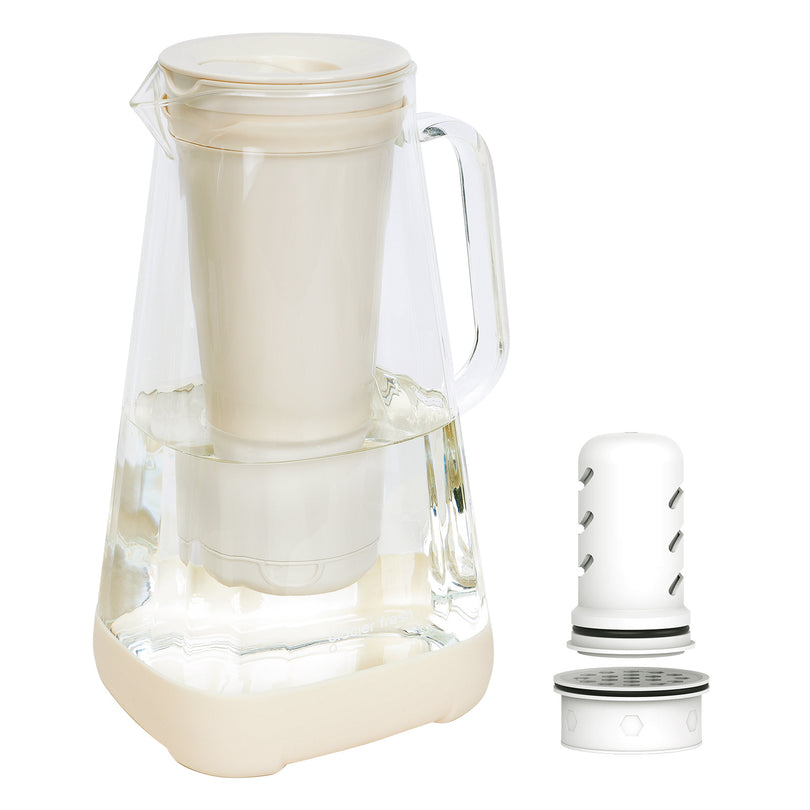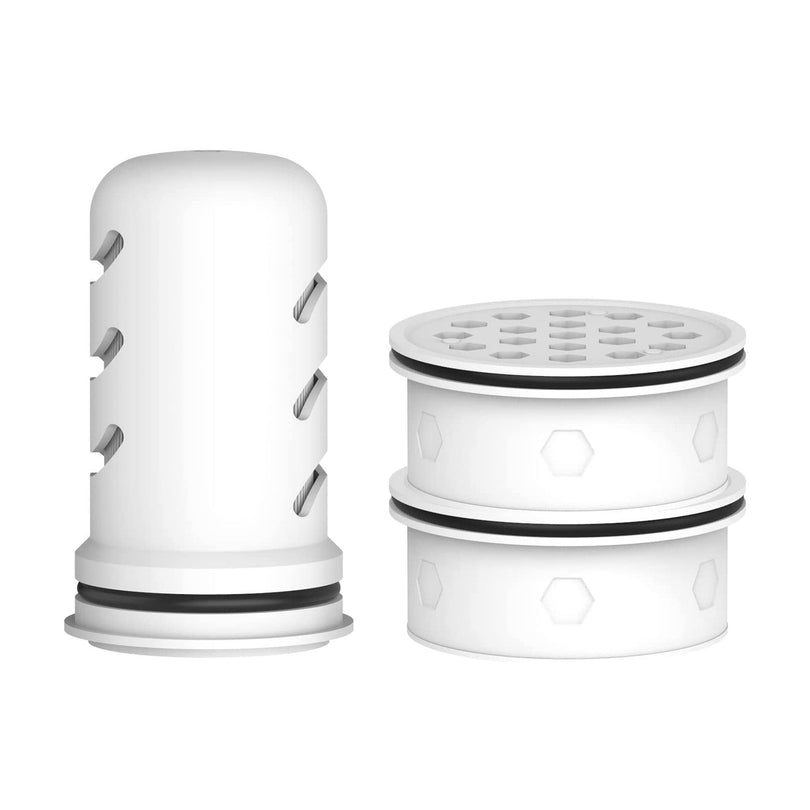Table of Contents:
Arten essentieller Mineralien im Trinkwasser
Vorteile gesunder Mineralien im Trinkwasser
Gesundheitsrisiken durch den Mangel an essentiellen Mineralien
Auswahl des richtigen Filtersystems
Tipps zum Erhalt von Mineralien in gefiltertem Wasser
FAQs
Abschluss
Suchen Sie nach Möglichkeiten, die höchste Qualität Ihres gefilterten Wassers sicherzustellen? Der Erhalt gesunder Mineralien ist der Schlüssel! Dieser Artikel untersucht die Arten essentieller Mineralien im Trinkwasser, ihre Vorteile und die gesundheitlichen Risiken, die mit einem Mineralienmangel verbunden sind. Wir geben Ihnen außerdem Tipps zur Auswahl des richtigen Filtersystems und zu Methoden zum Erhalt der Mineralien in Ihrem gefilterten Wasser. Nutzen Sie diese wertvollen Informationen für Ihre Gesundheit und die Ihrer Familie.
Arten essentieller Mineralien im Trinkwasser

Wenn es um die Arten essentieller Mineralien in Ihrem Trinkwasser geht, ist es wichtig, ihre Bedeutung zu verstehen. Die Wasserqualität spielt eine entscheidende Rolle für den Mineralstoffgehalt Ihres Trinkwassers. Die Mineralstoffaufnahme aus dem Wasser ist eine wichtige Quelle für essentielle Mineralien für den Körper. Allerdings kann ein Mineralstoffmangel auftreten, wenn der Mineralstoffgehalt im Wasser verbessert werden muss. Um sicherzustellen, dass Sie eine ausreichende Menge an essentiellen Mineralien erhalten, ist es notwendig, Wasser aus mineralstoffreichen Quellen zu trinken.
Mineralien wie Kalzium, Magnesium und Kalium sind entscheidend für die Erhaltung einer optimalen Gesundheit. Kalzium ist wichtig für starke Knochen und Zähne, während Magnesium für die Energieproduktion und Muskelfunktion von entscheidender Bedeutung ist. Kalium hilft, den Blutdruck zu regulieren und den Flüssigkeitshaushalt im Körper aufrechtzuerhalten. Diese Mineralien sind entscheidend für Ihre allgemeine Gesundheit und tragen zum Geschmack und zur Qualität des Trinkwassers bei.
Trinkwasser aus mineralreichen Quellen wie natürlichen Quellen oder Brunnen kann wichtige Mineralien liefern. Es ist jedoch wichtig zu beachten, dass der Mineralgehalt im Wasser je nach Quelle variieren kann. Um sicherzustellen, dass Sie die notwendigen Mineralien erhalten, sollten Sie mineralreiche Lebensmittel wie Blattgemüse, Nüsse und Samen zu sich nehmen.
Vorteile gesunder Mineralien im Trinkwasser
Muskelfunktion
Sorgen Sie für eine optimale Muskelfunktion, indem Sie Wasser trinken, das reich an essentiellen Mineralien ist. Nährstoffaufnahme, Elektrolythaushalt, Muskelregeneration, Flüssigkeitshaushalt und Mineralstoffmangel spielen eine entscheidende Rolle für die optimale Leistung Ihrer Muskeln.
Wenn Sie Wasser trinken, das reich an essentiellen Mineralien wie Kalzium, Magnesium und Kalium ist, kann Ihr Körper Nährstoffe besser aufnehmen. Dies ist wichtig für Muskelwachstum und -reparatur sowie die Erhaltung der allgemeinen Gesundheit.
Darüber hinaus ist ein ausgeglichener Elektrolythaushalt für eine gute Muskelfunktion unerlässlich, da er Muskelkontraktionen reguliert und Krämpfen vorbeugt. Eine ausreichende Flüssigkeitszufuhr unterstützt eine optimale Muskelfunktion, da Dehydration die Muskelleistung beeinträchtigen und zu Muskelermüdung führen kann.
Blutgerinnung
Um eine gesunde Blutgerinnung zu unterstützen, trinken Sie Wasser, das reich an essentiellen Mineralien ist. Eine ausreichende Blutgerinnung ist entscheidend für die Wundheilung und die Vermeidung übermäßiger Blutungen. Mineralstoffmangel kann diesen Prozess jedoch beeinträchtigen und zu anhaltenden Blutungen und verzögerter Heilung führen. Mineralien wie Kalzium, Vitamin K und Magnesium sind für die Blutgerinnung unerlässlich. Kalzium ist notwendig für die Bildung von Blutplättchen, die wiederum für die Gerinnung unerlässlich sind. Vitamin K hilft bei der Aktivierung von Proteinen, die die Gerinnung fördern, während Magnesium die Blutgerinnungsfaktoren reguliert. Daher ist es wichtig, auf die Wasserqualität zu achten und sicherzustellen, dass es die notwendigen Mineralien für eine optimale Blutgerinnung enthält. Durch den Konsum von mineralstoffreichem Wasser können Sie Mineralstoffmangel vorbeugen und die effiziente Aufnahme dieser lebenswichtigen Nährstoffe unterstützen.
Körperfunktionen
Trinken Sie mineralreiches Wasser, um optimale Körperfunktionen zu unterstützen und die Vorteile gesunder Mineralien in Ihrem Trinkwasser zu nutzen. Hier sind drei Möglichkeiten, wie diese Mineralien zu Ihrem allgemeinen Wohlbefinden beitragen:
1. Nahrungsergänzungsmittel: Mineralien wie Kalzium, Magnesium und Kalium sind wichtig für starke Knochen, die Regulierung des Blutdrucks und die Unterstützung der Muskelfunktion. Trinkwasser, das reich an diesen Mineralien ist, kann Ihre Ernährung ergänzen und sicherstellen, dass Ihr Körper die Nährstoffe erhält, die er benötigt.
2. Mineralstoffreiche Lebensmittel: Eine ausgewogene Ernährung ist zwar wichtig, aber mineralstoffreiches Wasser kann die Wirkung mineralstoffreicher Lebensmittel verstärken. Stellen Sie sich vor, Sie genießen einen Salat mit frischem Spinat, Avocado und Mandeln und wissen dabei, dass die Mineralien im Wasser die Aufnahme und Verwertung durch Ihren Körper zusätzlich unterstützen.
3. Elektrolythaushalt: Elektrolyte wie Natrium, Kalium und Chlorid sind für den Flüssigkeitshaushalt, die Nervenfunktion und die Muskelkontraktionen unerlässlich. Durch den Konsum von Wasser mit gesunden Mineralien können Sie den Elektrolythaushalt aufrechterhalten und die Gesamtfunktion Ihres Körpers unterstützen.
Gesundheitsrisiken durch den Mangel an essentiellen Mineralien
Geschwächtes Immunsystem
Ein geschwächtes Immunsystem aufgrund eines Mangels an essentiellen Mineralien kann das Risiko für Infektionen und Krankheiten erhöhen. Wenn Ihr Immunsystem geschwächt ist, kann es schädliche Bakterien, Viren und andere Krankheitserreger, die Sie krank machen können, weniger effektiv bekämpfen. Essentielle Mineralien wie Zink, Eisen und Selen unterstützen die Funktion des Immunsystems. Wenn diese Mineralien erschöpft sind, ist die Fähigkeit Ihres Körpers, Immunzellen und Antikörper zu produzieren, beeinträchtigt, was es Ihrem Körper erschwert, sich gegen Infektionen zu verteidigen.
Darüber hinaus sind essentielle Mineralstoffe an verschiedenen Prozessen des Immunsystems beteiligt, unter anderem an der Aktivierung und Regulierung von Immunreaktionen. Ohne eine ausreichende Versorgung mit diesen Mineralstoffen funktioniert Ihr Immunsystem möglicherweise nicht optimal, was Sie anfälliger für Krankheiten und Infektionen macht. Daher ist es wichtig, durch eine ausgewogene Ernährung oder Nahrungsergänzungsmittel ausreichend essentielle Mineralstoffe aufzunehmen, um ein starkes Immunsystem zu erhalten.
Beeinträchtigte kognitive Funktion
Ein Mangel an essentiellen Mineralien kann Ihre kognitiven Funktionen beeinträchtigen und Ihre Fähigkeit, effektiv zu denken, sich zu erinnern und Informationen zu verarbeiten, beeinträchtigen. Essentielle Mineralien wie Eisen, Zink, Magnesium und Jod sind für die Funktion und Entwicklung des Gehirns von entscheidender Bedeutung. Eisen ist beispielsweise für die Produktion von Neurotransmittern notwendig, die für die Kommunikation zwischen Gehirnzellen unerlässlich sind.
Zink ist an der synaptischen Plastizität beteiligt, die für Lernen und Gedächtnis notwendig ist. Magnesium unterstützt die Gesundheit der Gehirnzellen und hilft bei der Regulierung der Neurotransmitter. Jod ist wichtig für die Produktion von Schilddrüsenhormonen, die für die Gehirnentwicklung und die kognitiven Funktionen entscheidend sind.
Wenn diese Mineralien aufgebraucht sind, kann Ihr Gehirn möglicherweise nicht mehr optimal funktionieren, was zu Konzentrationsschwierigkeiten, Gedächtnisstörungen und einer eingeschränkten kognitiven Leistungsfähigkeit führt. Daher ist eine ausreichende Zufuhr essentieller Mineralien zur Unterstützung einer optimalen kognitiven Funktion von entscheidender Bedeutung.
Erhöhtes Risiko für chronische Erkrankungen
Wenn Ihrem Körper essentielle Mineralien fehlen, besteht möglicherweise ein höheres Risiko für chronische Krankheiten. Essentielle Mineralien spielen eine entscheidende Rolle für die Aufrechterhaltung der ordnungsgemäßen Funktion Ihres Körpers und unterstützen verschiedene biochemische Prozesse.
Ein Mangel an diesen Mineralien kann zu Ungleichgewichten und Störungen im Körper führen und die Anfälligkeit für chronische Krankheiten erhöhen. So wird beispielsweise ein Magnesiummangel mit einem erhöhten Risiko für Herz-Kreislauf-Erkrankungen wie Bluthochdruck und Herzkrankheiten in Verbindung gebracht. Ein niedriger Zinkspiegel wird mit einer Funktionsstörung des Immunsystems und einem erhöhten Risiko für Infektionen und entzündliche Erkrankungen in Verbindung gebracht.
Reduzierte Knochenstärke
Die Aufrechterhaltung eines optimalen Mineralstoffspiegels ist entscheidend für starke Knochen. Ein Mangel an diesen Mineralstoffen, wie Kalzium und Magnesium, kann zu einer verminderten Knochenstärke führen. Diese Mineralstoffe spielen eine wichtige Rolle bei der Knochenbildung und -dichte, und ihr Mangel kann das Risiko von Knochenbrüchen und Osteoporose erhöhen.
Kalzium ist beispielsweise ein wichtiges Mineral für den Aufbau und Erhalt starker Knochen. Ohne ausreichend Kalzium werden Ihre Knochen schwach und brüchig und sind anfälliger für Brüche. Ebenso ist Magnesium für die Knochengesundheit unerlässlich, da es zur Regulierung des Kalziumspiegels im Körper beiträgt. Daher ist eine ausreichende Zufuhr dieser essentiellen Mineralien für die Erhaltung der Stärke und Integrität Ihrer Knochen unerlässlich.
Auswahl des richtigen Filtersystems
Sorgen Sie für eine optimale Filterung, indem Sie das richtige System zum Erhalt gesunder Mineralien in Ihrem Wasser wählen. Die Wahl des richtigen Wasserfiltersystems ist entscheidend für den Erhalt der Mineralien und die Wasserqualität. Hier sind drei wichtige Faktoren, die Sie bei der Auswahl eines Filtersystems berücksichtigen sollten:
1. Filtermethoden: Verschiedene Filtersysteme verwenden unterschiedliche Methoden, um Verunreinigungen aus dem Wasser zu entfernen. Es ist wichtig, ein System zu wählen, das Schadstoffe effektiv entfernt und gleichzeitig wichtige Mineralien erhält. Achten Sie auf Systeme mit fortschrittlichen Filtertechnologien wie dem Schwerkraft-Wasserfiltersystem , das Verunreinigungen effektiv entfernt und gleichzeitig den Mineralgehalt erhält.
2. Mineralienrückhaltung: Einige Filtersysteme, wie die Umkehrosmose, können Verunreinigungen und Mineralien aus dem Wasser entfernen und so demineralisiertes Wasser erzeugen. Bestimmte Mineralien wie Kalzium und Magnesium sind jedoch für unsere Gesundheit unerlässlich. Achten Sie auf Systeme mit Mineralienrückhaltung, die sicherstellen, dass die wertvollen Mineralien nicht vollständig aus dem Wasser entfernt werden.
3. Gesundheitliche Vorteile: Berücksichtigen Sie die gesundheitlichen Vorteile eines Filtersystems. Achten Sie auf Systeme, die Verunreinigungen entfernen und das Wasser durch die Zugabe wertvoller Mineralien oder eine Verbesserung von Geschmack und Geruch aufwerten. So profitieren Sie von den gesundheitlichen Vorteilen sauberen und mineralreichen Wassers.
Tipps zum Erhalt von Mineralien in gefiltertem Wasser

Um die Mineralien in Ihrem gefilterten Wasser effektiv zu erhalten, sollten Sie einige wichtige Tipps beachten. Mineralien spielen eine entscheidende Rolle für unsere allgemeine Gesundheit und unser Wohlbefinden. Sie sind für verschiedene Körperfunktionen notwendig und werden in geringen Mengen für eine optimale Funktion benötigt. Durch die Filterung können diese wichtigen Mineralien jedoch manchmal aus unserem Wasser entfernt werden. Hier sind einige Tipps, die Ihnen helfen, die Mineralien in Ihrem gefilterten Wasser zu erhalten.
Erstens ist die Aufnahme mineralstoffreicher Lebensmittel in Ihre Ernährung eine gute Möglichkeit, eine ausreichende Mineralstoffzufuhr sicherzustellen. Lebensmittel wie Blattgemüse, Nüsse, Samen und Vollkornprodukte sind hervorragende Mineralstoffquellen. Durch den regelmäßigen Verzehr dieser Lebensmittel können Sie dazu beitragen, alle Mineralien wieder aufzufüllen, die während der Filtration verloren gehen können.
Zweitens kann eine verbesserte Mineralstoffaufnahme auch dazu beitragen, die Mineralien in Ihrem gefilterten Wasser zu erhalten. Bestimmte Nährstoffe wie Vitamin D und Vitamin C können die Aufnahme von Mineralien aus Ihrer Nahrung unterstützen. Der Verzehr vitaminreicher Lebensmittel wie Zitrusfrüchte und fetter Fisch kann die Mineralstoffaufnahme und -verwertung in Ihrem Körper unterstützen.
Darüber hinaus kann eine Mineralstoffergänzung notwendig sein, wenn Sie einen Mineralstoffmangel vermuten oder nicht genügend mineralstoffreiche Lebensmittel zu sich nehmen können. Lassen Sie sich von einem Arzt beraten, um festzustellen, ob Nahrungsergänzungsmittel für Sie geeignet sind, und stellen Sie sicher, dass Sie die richtige Dosierung einnehmen.
FAQs
Gibt es natürliche Möglichkeiten, den Mineralgehalt von gefiltertem Wasser zu erhöhen, ohne die Qualität zu beeinträchtigen?
Versuchen Sie, mineralstoffreiche Lebensmittel in Ihren Speiseplan zu integrieren oder mineralstoffreiche Methoden anzuwenden. So können Sie die Vorteile von Mineralwasser nutzen, ohne dessen Qualität zu beeinträchtigen. Erwägen Sie auch die Einnahme von Mineralstoffpräparaten.
Kann das Trinken von Wasser mit gesunden Mineralien die Verdauung und Nährstoffaufnahme verbessern?
Eine ausgewogene Mineralstoffzufuhr ist für eine optimale Verdauung und die allgemeine Gesundheit unerlässlich. Mineralstoffmangel kann sich negativ auf die Verdauungsgesundheit und das Darmmikrobiom auswirken.
Abschluss
Der Erhalt gesunder Mineralien ist daher für die Qualität von gefiltertem Wasser unerlässlich. Das Vorhandensein essentieller Mineralien im Trinkwasser bietet zahlreiche Vorteile für unsere Gesundheit, während ihr Mangel zu potenziellen Gesundheitsrisiken führen kann. Daher ist die Wahl des richtigen Filtersystems, das Verunreinigungen effektiv entfernt und gleichzeitig die nützlichen Mineralien erhält, entscheidend. Mit diesen Tipps stellen Sie sicher, dass Sie gefiltertes Wasser bester Qualität erhalten, das sicher und vorteilhaft für Ihr allgemeines Wohlbefinden ist.



















